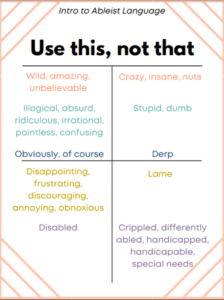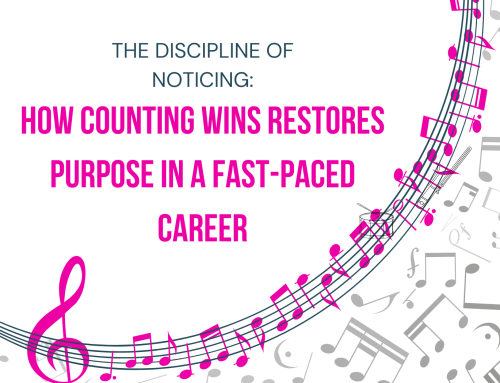Welcome to The Asterisk*, a new regular column where we’ll chat about diversity, equity, inclusion, and accessibility in music education. The function of an asterisk is to quickly give readers a baseline of knowledge so the reader can dive into content. This column aims to introduce or refresh deia concepts in a judgment-free space and provide ideas for incorporating deia principles into your teaching practice.
Happy Music in Our Schools Month, Women’s History Month, AND Brain Injury Awareness Month!
Today I’d like to talk about ableism and ableist language.
Ableism is discrimination or social prejudice against people with disabilities in favor of “normal” people. It is deeply ingrained in our culture and far more prevalent than most of us realize. Ableism is seen in a lack of accessibility in bathroom stalls, travel pathways, and parking, lack of accommodations in schools and social settings, discrimination in the workplace (disabled people are viewed as less productive or inferior to able-bodied workers), and in the overall social stigma towards people with disabilities.
As a disabled educator, I’m becoming increasingly aware of ableist language and its pervasiveness in our collective vocabulary. We see ableist language that deals with physical, sensory, mental health, intellectual, and learning disabilities. Like lame, crazy, and stupid, some words are used with such a casualness that many of us don’t realize they reinforce ableist ideas and stereotypes. I feel that these words no longer have a place in schools unless they’re part of a larger conversation about discrimination and ableism.
Today, I am offering a chart with a few common ableist terms and suggestions for mindfully getting one’s point across without placing disabled people in a position of “other” or “less than.” Feel free to reach out to me directly if you have any questions about this content. I’m happy to discuss this topic further.
This post is just a starting point when it comes to ableism and disability in the classroom – expect a Part 2 (and Part 3) later on.





So if I use “crippled” as an adjective (ex: the crippled economy of the 1930s led to…), I’m using offensive or ableist language? I’m genuinely curious.